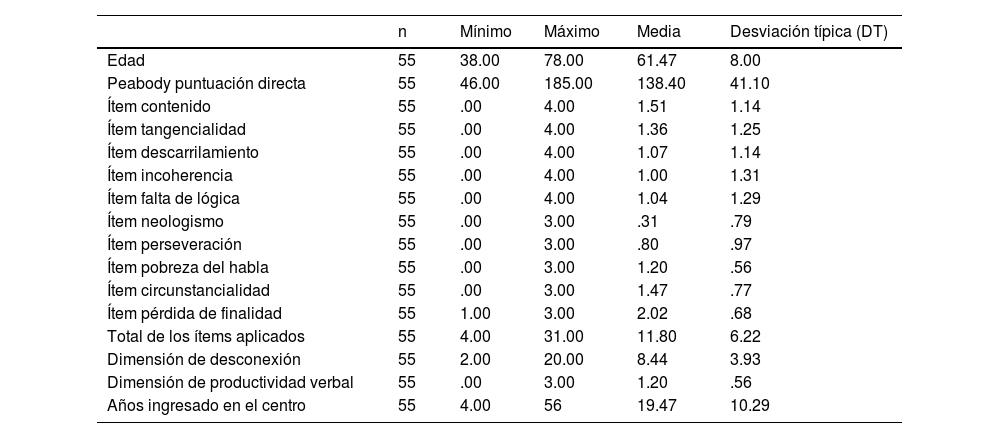Estudiar las características del lenguaje y del vocabulario receptivo en 50 pacientes que padecen esquizofrenia y 5 que padecen trastorno esquizoafectivo, todos de evolución crónica.
MétodoSe sigue un diseño descriptivo correlacional y explicativo con un método de recogida de datos cuantitativo; se aplican la escala Thought, Language and Communication (TLC) y el test Peabody.
ResultadosLos participantes tienen una media de 61.47 años (σ=8.00), llevan internados en el centro una media de 19.47años (σ=10.29). Con la TLC se evalúan dos dimensiones del trastorno del pensamiento: la hipoproductividad y la desconexión verbal. La desconexión correlaciona positivamente con el Peabody y los años de ingreso, mientras que la subproducción verbal correlaciona con años de ingreso y edad. El Peabody correlaciona con el grado de formación, con los años de ingreso y con la desconexión de TLC.
ConclusionesLos participantes presentan alteraciones del lenguaje, particularmente pobreza del habla y desconexión verbal con puntuaciones que varían de leve a moderado. Los pacientes más formados comprenden mejor el vocabulario. La subproducción verbal es mayor con más edad y con más años de ingreso, mientras que la desconexión es mayor en los pacientes con más años de ingreso. Presentan mayores dificultades en la comprensión del vocabulario cuando aumentan los años de ingreso y cuando tienen más dificultades en la desconexión.
To study the characteristics of language and receptive vocabulary in 50 patients suffering from schizophrenia and 5 suffering from schizoaffective disorder, all with chronic evolution.
MethodA descriptive, correlational, and explanatory design with a quantitative data collection method was used, applying the Thought, Language and Communication (TLC) scale and the Peabody Test.
ResultsThe participants have a mean age of 61.47years (σ=8.00), they have been in the centre for an average of 19.47years (σ=10.29). Two dimensions of thought disorder are assessed with the TLC: hypoproductivity and verbal disengagement. Disconnectedness correlates positively with the Peabody and years of entry, whereas verbal underproduction correlates with years of entry and age. The Peabody correlates with the degree of education, and with years of entry, and TLC disconnection.
ConclusionsParticipants present language impairment, particularly poor speech and verbal disconnection with scores ranging from mild to moderate. The more educated patients have a better understanding of vocabulary. Verbal underproduction is higher with older age and more years of admission. Disconnection is higher in patients with more years of admission. They present greater difficulties in understanding vocabulary as the years of admission increase, and when they have more difficulties in disconnection.










